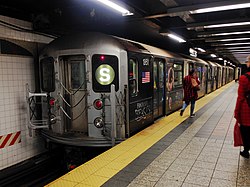42nd Street Shuttle
| 42nd Street Shuttle | |
|---|---|
 |
|

42nd Street Shuttle train of three ad-wrapped R62A cars at Grand Central.
|
|
 |
|
| Northern end | Times Square |
| Southern end | Grand Central |
| Stations | 2 |
| Rolling stock | 10 R62As (3 trains) |
| Depot | Livonia Yard |
| Started service | August 1, 1918 |
| 42nd Street Shuttle | |
|---|---|
| Overview | |
| Type | Rapid transit |
| System | New York City Subway |
| Status | Operating |
| Locale | Midtown Manhattan |
| Termini |
Times Square Grand Central |
| Stations | 2 |
| Operation | |
| Opened | October 27, 1904 |
| Owner | City of New York |
| Operator(s) | New York City Transit Authority |
| Character | Underground |
| Rolling stock | R62A |
| Technical | |
| Line length | 0.44 miles (0.71 km) |
| Number of tracks | 3 (formerly 4) |
| Track gauge | 1,435 mm (4 ft 8 1⁄2 in) |
| Electrification | 625V DC third rail |
The 42nd Street Shuttle is a New York City Subway shuttle train service that operates in Manhattan. Part of a former Interborough Rapid Transit Company (IRT) line, it is sometimes referred to as the Grand Central/Times Square Shuttle, since these are the only two stations served by the shuttle. It runs at all times except late nights, connecting Times Square to Grand Central under 42nd Street. It is the shortest regular service in the system, running about 2,700 feet (820 m) in under two minutes.
The 42nd Street Shuttle is part of the A Division of New York City Transit, and the tracks that it uses opened in 1904 as part of the first subway in the city. In order to distinguish it from the other shuttles in the system, NYCT Rapid Transit Operations internally refers to it as the 0 (zero). Its route bullet is colored dark slate gray on route signs, station signs, and rolling stock with the letter "S" on the official subway map.
The subway through which the shuttle runs was opened on October 27, 1904, the first day of subway service in Manhattan. In 1910, the platforms at the two stations were extended. A plan called the Dual System of Rapid Transit in 1913 was worked out with the Interborough Rapid Transit and the Brooklyn Rapid Transit companies, and was announced by the Public Service Commission. As part of the plan, the existing IRT subway would be reconfigured into what was called the "H system". From 42nd Street, new lines would be built northward in Lexington Avenue and southward in Seventh Avenue, connecting with the old subway to form East Side and West Side main lines. The leftover segment under 42nd Street was to be used for a shuttle connecting the two main lines.
...
Wikipedia
